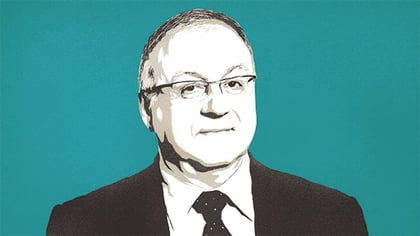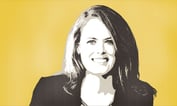“The desire to maintain the status quo is more powerful than the momentum to change it.” That bit of wisdom came from Simon Sinek, who I had the opportunity to interview at BNY Mellon Pershing’s 2019 INSITE conference.
Sinek challenged the 2,000 attendees to throw away many of the commonly-accepted (yet outdated) management philosophies made popular in the 1980s in favor of a new goal — to build more compelling businesses. People should be excited to get to work, in a place where they feel safe and fulfilled by what they do.
What not to do? Force rankings of employees based on the goal of mustering out the weakest links; measure against key performance indicators that focus on performance vs. competitors instead of measuring our own momentum; driving strategies designed to beat the competition instead of plans to satisfy the customer.
Drawing from his new book The Infinite Game — scheduled to be released Oct. 15, 2019 — Sinek noted that leaders with a “finite” mindset tend to think in terms of fixed rules, agreed upon objectives, and known players (think baseball, hockey or soccer). Leaders with an “infinite” mindset realize there are both known and unknown players and that the goal is not to beat your opponent, but to stay in the game as long as possible. That mindset should exist among all business leaders because it allows us to learn, to be resilient and to anticipate change.
“For finite thinkers, a competitor is somebody you want to beat,” he said. “For infinite thinkers, a worthy rival is another player in the game whose very existence reveals your weaknesses.” When you understand the difference, he added, you will also appreciate what steps you must take to create a business to last.
As an example, he cited how Microsoft was obsessed with beating Apple. Meanwhile, Apple was driven by the desire to help teachers teach and students learn. Consequently, Microsoft did not compete well in areas like MP3 players, mobile phones and tablets, while Apple as a mission-driven business became more enduring and more relevant to the education and retail market. Ironically, their focus was not on becoming larger than others, but as a result, they have become one of the world’s most valuable businesses.
Using other metaphors about how we make decisions, Sinek reminded us of the Vietnam War which, for those of us who were around at the time, recall how it appeared to be an endless struggle that created great stress at home as dissenters outnumbered supporters.
Amazingly, the United States lost 58,000 troops in the war while North Vietnam lost more than three million people. Yet Vietnam prevailed and the United States gave up its effort to stop the Communist dominos from falling in Southeast Asia. Sinek observed that the Viet Cong would have fought to the last man because they were fighting for their independence, while the United States lost its will to win because its mission had become unclear and support at home had waned.
Financial services has become equally obsessed with domination, said Sinek — pay the most to the highest performers, and show the greatest growth, regardless of the culture being fostered. That juxtaposition of key drivers in businesses led by finite and infinite thinkers is stark, yet likely familiar to many advisors who consider how they can influence the lives of their clients, rather than how they can grow assets or beat the competition.
Sinek also observed how disruptors have changed so many traditional businesses who appeared blind-sided by the competition. He asked: “Why did a computer company invent iTunes and not a company in the music industry? Why did Amazon build the e-Reader (Kindle) and not a company in the publishing industry? How come Netflix wasn’t built by the movie industry but by a professional marketer and mail order executive?”









 July 29, 2019 at 06:21 PM
July 29, 2019 at 06:21 PM











